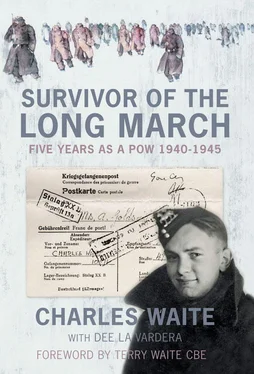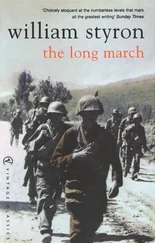Jack nodded. ‘ Ja, das Klavier. Schön ,’ and looked at us all. We nodded in agreement, not sure where all this was leading. ‘ Musik. Ich liebe ,’ we chorused.
The guard smiled and started miming playing a piano accordion, moving his arms about as though pushing bellows in and out. ‘ Sie möchte,’ – you would like, pointing at Jack, ‘ ein Akkordeon ?’
Everybody said ‘ Ja, ja,’ looking at each other, ‘ Ein Akkordeon. Ja, ‘ wondering if the guard had gone mad. I couldn’t believe it; he was asking us if we would like an accordion. How on earth could he get us an instrument or anything like that? Perhaps he had one at home he wanted to get rid of and saw an opportunity or he had a friend who could get one. But I couldn’t see what he or any shopkeeper would do with our camp money, which was worthless.
A few days later the guard came back. He said he had been to a shop in the town to find out how much they wanted for the instrument and he named an amount. Let’s say it was 1000 Reichsmark and we said ‘ Ja, ja,’ again, and collected up all the money we could find and handed it over. He came back the next day carrying an enormous parcel, properly wrapped up in paper with string round it. He hadn’t tried to hide it and nobody had stopped him on the way into the camp. We pushed Jack forward to receive it. ‘Go on, it’s for you,’ and ‘you can play.’
When he opened the parcel and saw the lovely accordion his face lit up. It must be terrible for somebody with a special talent or skill to be stuck in a place like that with no way of practising it. He immediately started opening and closing the accordion, breathing some life into it. He managed to play a few scales and we all clapped. It was wonderful to hear a sound like that after being starved of music for so long. From then on Jack practised regularly and we enjoyed listening to him.
As he got better, he played all sorts of music to cheer us all up. We were thrilled that nobody stopped him. Perhaps the guards got some pleasure from hearing the sound of the accordion wafting over to their quarters or they just thought if we were listening to it in our spare time then we couldn’t be getting up to any mischief. We had singsongs together in the evening and sometimes some of the fellows danced around together, no doubt imagining they were holding the sweetheart they had left behind. It almost made me want to dance. But I didn’t.
The question of proper wages arose again later when a fellow joined our camp in exchange for one of our men who had gone off sick. We were sitting round talking about money one evening, saying how worried we were about our families. There were a few married men with children among us, so obviously the main bread winner of their family was absent from home. This fellow told us that we could send money home to our families.
‘But we haven’t got any money,’ somebody said.
‘Of course you have. Your army pay is still being paid into your bank at home.’
We hadn’t thought of that. ‘That’s no good with us stuck here,’ said another.
‘Now I’ve done this myself,’ he said. ‘You can write from here to your paymaster and send it with your normal camp mail. You ask them for such and such an amount to be sent to whoever you want to. And Bob’s your uncle.’
I couldn’t believe it but then decided that there was nothing to lose so I might as well have a go. When we were given our next supply of camp writing paper, I did exactly that. I didn’t know the address but marked it to The Paymaster, c/o The War Office, London, England. I had no idea how much I had in the account but I asked for £100 to be forwarded to my parents. Two or three months later, I had a letter from my mother thanking me for the money. I was amazed that it had worked and tried it again, sending them another £100. My only thought was that they could be in trouble and I wanted to help. Money was no use to me in there and I never thought about needing it when I got home. I didn’t plan for the future; I just lived from day to day.
When I finally got home after the war, my parents had kept the money for me and paid it all back. That was why I could afford to buy Lily an enormous 18 carat gold diamond engagement ring on my return.
* * *
As the months slipped by and then the years, we settled into our life in the camp. We had our work and we had our leisure time – evenings and Sundays. Much of that was taken up with our own little jobs such as washing and mending clothes, darning socks and pants and writing letters. We also socialised, playing football and cards and listening to Jack play. But even this got monotonous. I know some camps received books and board games, they even had records and gramophones but not where I was. We had to make our own entertainment, which wasn’t easy. It was important to have an outlet for our anger and frustrations and also good to have a laugh and a bit of fun.
Many of the other prisoners were good with their hands and had a wealth of experience from civilian life. We had a tailor, a chap who lived not far from me in Barking, who was able to make things like hats and mittens out of bits of old uniform. He made me a smart new cap which I liked to wear as it wasn’t army regulation. We had a cobbler who helped us mend our boots with leather patches which came in some of the Red Cross parcels. He made me a belt out of the tops of old army boots. Laurie, the butcher, knew about animals, looking after and killing them; Jimmy, the gamekeeper, loved the outdoor life and was knowledgeable about birds and plants. There was Heb, on his way to becoming a proper blacksmith. My ability to contribute was limited as I didn’t have any special skills and had never been apprenticed to a trade or profession. Being able to add up the price of a pound of potatoes and half a pound of carrots wasn’t much use here. So I hoped the opportunity would arise for me to help out in some way.
At roll call one morning, the Unteroffizier read out the work schedule. He needed a group of men for forestry work. Eight of us, including me and three of my pals, were allocated a two months’ work detachment in the Rosenberg Forest region, working under the jurisdiction of a local forest ranger. Although it wasn’t too far away from the camp, we were working in a large area of forest and could cover a lot of ground during the day. So we had to take our own food with us for the day. The soup cart wouldn’t be able to come out to us. It was a welcome break from the farm and the change of scene and different type of work gave us greater freedom. Another lucky break for me.
We had to walk about 5km to the working site and one of guards escorted us as far as a clearing, bang in the middle of this vast conifer forest. We knew then that we had come to somewhere special. It was beautiful and so quiet, just bird song and wind rustling the tops of the pine trees. The guard left us when the forest ranger appeared, a chap dressed all in green with a sort of Tyrolean hat and feather sticking out. He carried a bayonet, not as a weapon, but to mark the trees for cutting down. He told us a bit about the types of trees in the forest and the work of a forester, in his broken English mixed with a lot of arm waving and hand gestures.
There were mainly pines, firs and spruce and he pointed to some logs piled up ready for collection. ‘ Holz ,’ – wood, he said. We nodded. ‘ Für Mäntel’ , – for coats, he was stroking the front of his jacket. We looked surprised. ‘ Ja , for ze clothes.’ I couldn’t believe it but it was true. He showed us the equipment, a couple of cross-cut saws and some choppers, pretty basic, and demonstrated how to cut and fell a tree, chip off any smaller lower branches and saw the trunks into the required lengths for stacking and then transportation later.
Читать дальше




![Джеффри Арчер - The Short, the Long and the Tall [С иллюстрациями]](/books/388600/dzheffri-archer-the-short-the-long-and-the-tall-s-thumb.webp)







